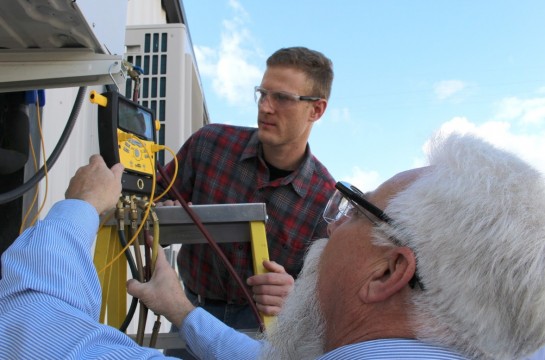So you want to attend an HVAC school but you’re not entirely sure what the job will entail. You know it will require knowledge of air conditioners, but what kind of environments are you going to be working in? What will you need to know? When you think of air conditioners there is a good chance that you’re only thinking of residential housing, but you can be rest assured that there is more to it than that. There are many environments that an HVAC professional will need to work in, and we’re going to cover the three most common. Let’s start with the most basic definition of HVAC and what you’re going to need to compete in this demanding field.
Understanding HVAC Service Training
 The term HVAC is actually an industry acronym which stands for:
The term HVAC is actually an industry acronym which stands for:
- Heating
- Ventilation
- Air Conditioning
HVAC technicians will work to maintain air conditioning systems but they will also install and repair for a variety of different companies. As with any field there are a number of different branches to consider, one of which is the HVAC refrigeration technician line. This type of technician works with the different coolant substances, processes and will be intimately familiar with all of the different hardware in the industry. This of course includes the legacy systems which are still in use at many different facilities across the country.
A refrigeration technician will assess problems relating to climate control as well as overall problems with the system itself. At our heating and air conditioning school you will learn to evaluate systems and perform inspections to ensure that they are properly running throughout the season, and of course address any potential problems that may appear over time. Finally, as an HVAC technician you will need to prepare to be on call 24/7 – you never know when disaster may strike, especially in the commercial industry.
The Most Common HVAC Environments
So where will you be working as an HVAC specialist? There are actually several different venues, and you will more than likely be sent to at least one of them at some point during your career. Let’s take a look at some of the most common:
Factories – The HVAC systems in large factories are without a doubt some of the most complex and most necessary. Not only are they essential to worker comfort, they are a necessity in keeping products in good condition, ultimately ready for sale. Without a working HVAC system, factories would be in serious trouble. At our heating and air conditioning school you will quickly learn how to work on these large systems and bring factories back to life.
Retail – These types of facilities are often quite large, especially if you’re dealing with warehouse style stores. Just as with factories, you need to make sure that the customers within the facility remain comfortable. They shouldn’t even have to think about the air conditioning system when they pass through the doors – comfort is simply a state of being. From small stores to large, you have your work cut out for you.
Food Service – Just as with retail, the food service industry probably isn’t something that you think about when you are working with air conditioning, but it is definitely something that you will have to consider if you want the job. The food service industry is huge and the customers need to be comfortable. That being the case, there are lots of things to consider and plenty of jobs for the aspiring HVAC technician.
Our air conditioning repair school is ready to train you to earn the HVAC certification you need to get this proverbial show on the road. It won’t be too long before you’re ready to become the technician you’ve always dreamed of, and it’s time to start planning for your future. Let us help whether you just need training or a bit of financial assistance to get you started in the field. Remember, the HVAC field is a career, not just a job! It’s a foundation for the rest of your life.
For more information about graduation rates, the median debt of students who completed the program, and other important information, please visit our website: https://iticollege.edu/disclosures/




